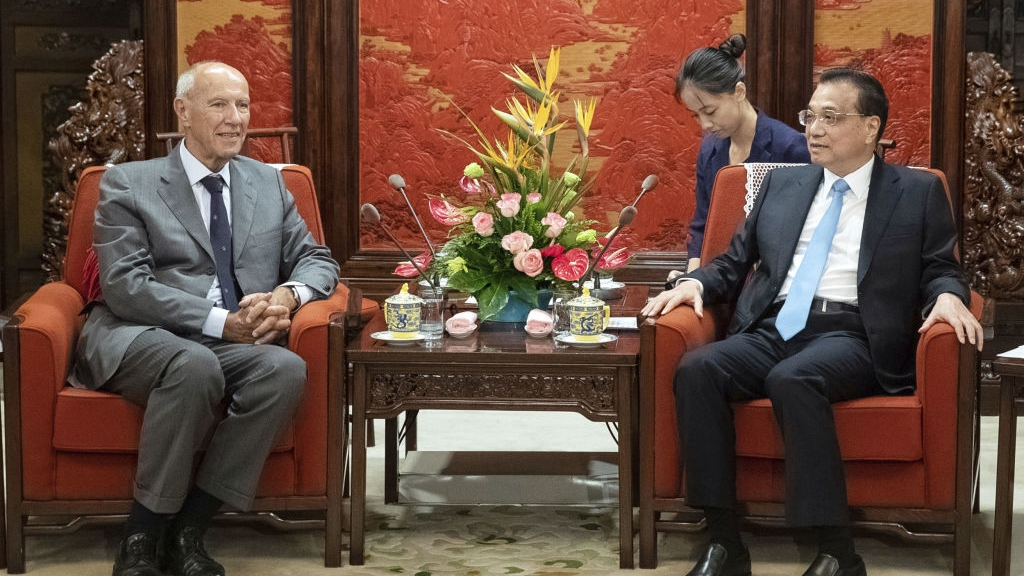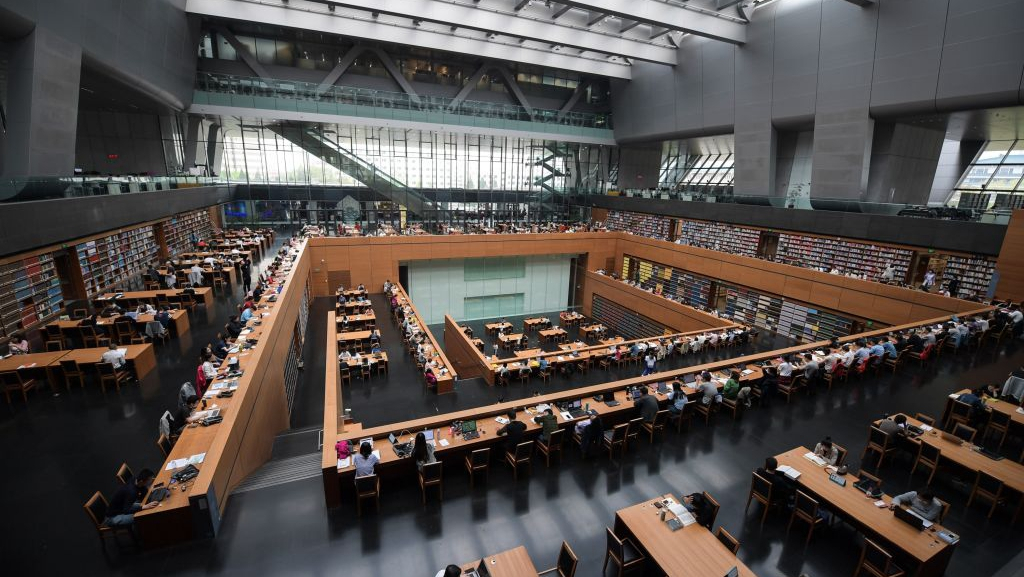
Opinion
08:33, 23-Apr-2019
Safeguarding knowledge economy in the digital age
Aaron Zou

Editor's note: Aaron Zou is a California-based PhD student specializing in media and cultural studies. The article reflects the author's opinion, and not necessarily the views of CGTN.
In 1995, the United Nations Educational, Scientific and Cultural Organization (UNESCO) proclaimed April 23 as the World Book and Copyright Day, with a view to promoting reading, publishing and copyright protection. Ever since then, it has been celebrated by a growing number of people and organizations across the world.
It is now observed by millions of people in over 100 countries. Every year, UNESCO and the international organizations representing publishers, booksellers and libraries designate a city to be the World Book Capital for a year to organize related activities and celebrations. Kuala Lumpur is currently designated to be the World Book Capital for 2020.
UNESCO chose 23 April as the date for the World Book and Copyright Day because it marks the anniversary of the birth or death of a number of well-known writers, including Miguel Cervantes and William Shakespeare.

Kuala Lumpur will be the World Book Capital for 2020. /VCG Photo
Kuala Lumpur will be the World Book Capital for 2020. /VCG Photo
It provides an occasion for commemorating these great writers and the legacies they left to the world. Special events are organized on this day, such as reading relays of books and plays, literary competitions, the distribution of bookmarks, and activities held to heighten public awareness of copyright regulations.
Children and young people are particularly encouraged to read books and to appreciate literature by the organizers of this annual event.
Reading in the digital age: E-books and physical books
Reading is a significant part of people's everyday lives, regardless of age. With the development of digital technology, such as the 5G network, more and more people have turned toward e-reading.
According to the 2018 White Paper on China's Digital Reading, the number of digital readers in China has reached 432 million as of 2018.
The development of smartphones, tablets and e-book devices, along with the expanding resources of electronic books and periodicals available online, has enabled people to read anytime and anywhere at their convenience.
The rise of e-books has been a boon for people in all walks of life. E-books are not only easy to store, but they are also more durable than their paper-based counterparts.
For researchers, electronic publications have allowed for easy access to and reviews of a vast body of literature. They are much easier to search, index and reference than physical books.

InfoWatch Group president Natalya Kasperskaya speaks at the Digital Business Evolution Forum at the Moscow Digital Business Space, April 18, 2019. /VCG Photo
InfoWatch Group president Natalya Kasperskaya speaks at the Digital Business Evolution Forum at the Moscow Digital Business Space, April 18, 2019. /VCG Photo
For average readers, with the rise of e-books, book search and purchase could be done instantaneously. E-books also tend to be more environment-friendly.
Despite the merits and popularity of e-books, it may be simplistic to assume that they would replace physical books entirely.
In fact, the market demand for physical books remains robust and is growing in tandem with the e-books market not only in China but also in many Western countries.
Physical books still remain a staple part of the publishing industry. Their advantages are not to be neglected. In recent years, there has actually been a rekindled popular interest in physical books.
The very materiality of a physical book – how it feels in your hands as you hold it and flip through it – is irreplaceable, and gives rise to a profoundly aesthetic reading experience. Physical books also tend to cause less stress on your eyes.
They often have more appealing packaging and are thus more collectible. In this sense, e-books and physical books actually often complement each other rather than compete with each other.
In order for physical books to survive and thrive in the market, product differentiation and upgrading will be a key strategy to further explore.

A digital tablet. /VCG Photo
A digital tablet. /VCG Photo
As people's demand for cultural consumption has been upgraded, physical books are expected to deliver a more aesthetic and pleasurable reading experience.
The packaging, design, and formatting of physical books need to be upgraded to meet the increasingly higher reader expectations. The development of online book retailing will help boost the continual growth of physical books.
On the other hand, e-books will continue to grow in the market and remain a popular choice to readers. With the development of compatible electronic devices, the affordances of e-books are going to be further expanded.
They will become easier to edit and annotate, and come in more appealing formats; audio books will also become more available to meet people's needs.
Toward a diversified knowledge economy

Chinese Premier Li Keqiang (R) and Francis Gurry, director general of the World Intellectual Property Organization, hold talks at the Zhongnanhai leadership compound, Beijing, Aug. 28, 2018. /VCG Photo
Chinese Premier Li Keqiang (R) and Francis Gurry, director general of the World Intellectual Property Organization, hold talks at the Zhongnanhai leadership compound, Beijing, Aug. 28, 2018. /VCG Photo
The booming of various reading forms will shape a more diverse and vibrant knowledge economy in the future. A crucial protector of the booming knowledge economy is a solid system of copyright laws and regulations ready to tackle new challenges in the digital age.
Not only should new regulations be enacted to deal with new problems and situations, but old regulations that worked well for analog products also need to be amended or updated to regulate the production, use, and sales of e-books.
Alongside the strengthened copyright protection, there will likely be more alternative licensing options for intellectual property.
Creative Commons, Open Source and Open Access are several major alternatives that are likely to develop especially in the tech sector and in academia. These alternatives are not meant to challenge the rationale for copyright protection, but complement it and diversify it so that people will have more options to license their own intellectual properties. These alternatives will also serve to leverage the collective intelligence of the internet-based community of knowledge production and sharing.
Strengthened copyright protection in China
In the past years, China has made steady and remarkable progress in the area of copyright protection. China's copyright laws and regulations have been continuously improved since its entry into the WTO in 2001.
Even before 2001, China had been a member of the World Intellectual Property Organization (WIPO). In 2008, China's National Intellectual Property Strategy Outline was promulgated to advance copyright protection.

The National Library of China. /VCG Photo
The National Library of China. /VCG Photo
Every year since then, an annual plan for promoting intellectual property strategies has been issued. Driven by the overarching vision laid out in the Outline, China has been actively exploring the specialization of adjudication for intellectual property (IP) rights in the past decade.
The WIPO Office in China opened in Beijing in July 2014 to better promote WIPO's international intellectual property services and products in China. By the end of 2014, three courts specialized in IP rights were established in Beijing, Shanghai, and Guangzhou.
From 2017, more than a dozen specialized IP tribunals were formed successively in major cities such as Nanjing, Suzhou, Chengdu and Wuhan. In January 2019, the Supreme People's Court (SPC) enacted a national appellate court for IP cases. The newly established Intellectual Property Rights Court for Appeals functions as a permanent division under the SPC and will primarily handle appeals in civil and administrative cases of technology-related intellectual property disputes nationwide.
The establishment of such a nationwide system of specialized IP adjudication will help to better protect copyright in the digital age. With strengthened copyright protection, creativity will be incentivized and more high-quality literary and artistic works will be produced.
(If you want to contribute and have specific expertise, contact us at opinions@cgtn.com.)

SITEMAP
Copyright © 2018 CGTN. Beijing ICP prepared NO.16065310-3
Copyright © 2018 CGTN. Beijing ICP prepared NO.16065310-3